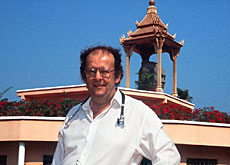Playing for children’s lives in Cambodia

Every year an estimated 600,000 children receive first-class medical care in one of the world's poorest countries, and it's all down to the work of a Swiss doctor and his cello.
Paediatrician Beat Richner uses his passion for music to raise funds for the three children’s hospitals that he has set up in Cambodia.
Twice a year, he travels from the capital, Phnom Penh, to Switzerland to perform, inform and raise money.
At his free concerts, the man – affectionately known by his stage name Beatocello – talks to the audience about the diseases affecting Cambodian children and what his hospitals are doing to help.
And then he plays his cello.
“The cello is my weapon and it’s a good weapon because it has a human voice,” he told swissinfo.
Hospital funding
Over the past ten years, Richner’s concerts have brought in over $100 million, mostly from Swiss donors.
The money funds the children’s hospitals along with a maternity ward for HIV positive mothers.
Twenty years of war and the brutal Khmer Rouge regime left Cambodia in a state of extreme poverty with 95 per cent of families unable to afford child health care.
Although the Khmer Rouge forced the Swiss paediatrician to abruptly leave the country in the 1970s, he was later asked by the Cambodian government to come back to continue his work.
The hospitals – considered some of the best in the developing world – save the lives of an estimated 30,000 children each year by offering free health services.
Role model
Richner’s projects have attracted the attention of a number of governments, who are interested in emulating his efforts.
“The South African president, Thabo Mbeki, visited me in Cambodia and said that our project was a vision for how the hospitals could be run for black people in South Africa,” Richner told swissinfo.
He believes that avoiding corruption, which is rampant in Cambodia, is one of the main reasons for the success of his projects.
Richner says he pays his staff good wages, which allows them to maintain a decent lifestyle, without having to resort to petty crime.
First-class healthcare
The high quality of care that the hospitals provide has led a number of international aid organisations to take notice of his efforts.
“We were always attacked by the WHO [World Health Organization] and Unicef for providing medical care that was too expensive and luxurious,” recalls Richner.
“But now our government has proven that the relationship between costs and healing rates is much better in our hospitals than in all other Third World hospitals.”
Governments from a number of countries, such as Sierra Leone and Burma, have invited Richner to set up health care facilities.
Ongoing project
But Richner believes he needs to remain in Cambodia to ensure the sustainability of the hospitals there.
To spread the knowledge he’s gained over the past decade, he has set up postgraduate courses in Cambodia to teach doctors how to build and run hospitals successfully in developing countries.
Richner’s efforts saw him crowned by television audiences as “Swiss of the Year” for 2002, a decision that he welcomed for two reasons: first, the award showed that the Swiss continued to support his work; and second, it drew more attention to his cause.
“The win is a small revolution against the cynical lifestyle of the materialistic West. That people voted for something humanitarian is quite extraordinary,” he said.
swissinfo, Karin Kamp
The hospitals treat 600,000 children each year.
Operating costs are $13 million per year.
1,100 Cambodians are employed by the hospitals.
The hospitals save the lives of some 30,000 children each year.
95 per cent of families in Cambodia are too poor to pay for child health care.

In compliance with the JTI standards
More: SWI swissinfo.ch certified by the Journalism Trust Initiative

You can find an overview of ongoing debates with our journalists here . Please join us!
If you want to start a conversation about a topic raised in this article or want to report factual errors, email us at english@swissinfo.ch.